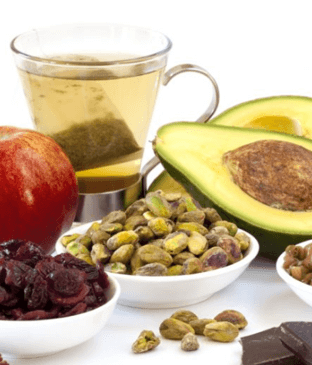Having trouble falling asleep? You might have a lot on your mind, but it could be what’s in your stomach that’s keeping you awake.
A key study confirms what has long been suspected—that our food choices are strongly linked to sleep quality and insomnia.
The sleep robbers are the usual dietary culprits: sugar, saturated fat, and low-fiber foods. Here’s what we know:
Carbs and Sleep
High-carb meals have been shown to promote drowsiness. That’s pretty easy to relate to—just think about how you feel after eating a full plate of pasta or big tortilla for lunch. The higher the glycemic index, the sleepier people feel. Interestingly, this effect is even stronger in women than men.
But the effect of high glycemic carbs on sleep doesn’t stop there. At night, once we finally drift off to sleep, those who filled up on low-fiber carbs had significantly more disrupted sleep, and were awakened much more frequently.
Saturated Fats and Sleep
Foods rich in saturated fats were tied to less time spent in the most restorative, slow-wave phases of sleep. This stage of sleep is especially important for processing and consolidating daytime memories. Want to learn more about saturated fats? Check out our module on dietary fats.
Implications of Poor Sleep
Apart from the obvious problems of lack of energy and concentration, too little quality sleep has some serious health consequences. High blood pressure and heart disease are more likely—and more serious—in poor sleepers.
But even if poor sleep doesn’t lead to disease, the consequences can still be lethal. A survey by the Centers for Disease Control showed that 1 out of 25 drivers fell asleep behind the wheel in the previous 30 days.
Sleeping Med…or Med Diet?
This information linking poor diet and sleep couldn’t have come at a better time. There has been an astounding tripling of sleep aid prescriptions in an 8-year period. Today, one out of every 25 adults in the US reports having taken a prescription sleeping medicine in the last 30 days.
Meds might be a reasonable solution for a small number of people with sleep problems, especially for very short-term use. But probably not the best answer for a full 4% of U.S. adults.
Before giving up on better sleep and considering a prescription med, why not try some simple steps to dreamier nights? Some basics include cutting back on caffeine and shutting down the screens long before bedtime. In addition, see for yourself what impact dietary changes might make in improving your sleep.
Sleep on This
Try cutting back on sugary desserts, breads, potatoes, and rice, along with starchy snacks. Skip the cheesy foods and greasy meat dishes. And add more fiber with fruit and vegetables. This stands a good chance of helping your sleep—and the side-effects are amazing!
Reference: Food and Sleep
Interested in living a healthier lifestyle?
Learn the essentials of eating and living healthfully in our interactive, user-friendly learning program for the public.
Clinicians: Do you feel confident responding to patient questions about nutrition?
Take our award-winning condensed interactive nutrition CME—and learn what every clinician should know about nutrition.



